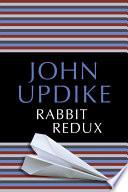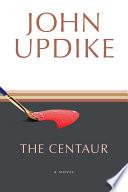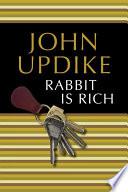“Dreams come true; without that possibility, nature would not incite us to have them.”
Source: Self-Consciousness : Memoirs (1989), Ch. 3
John Hoyer Updike was an American novelist, poet, short-story writer, art critic, and literary critic. One of only three writers to win the Pulitzer Prize for Fiction more than once , Updike published more than twenty novels, more than a dozen short-story collections, as well as poetry, art and literary criticism and children's books during his career.
Hundreds of his stories, reviews, and poems appeared in The New Yorker starting in 1954. He also wrote regularly for The New York Review of Books. His most famous work is his "Rabbit" series , which chronicles the life of the middle-class everyman Harry "Rabbit" Angstrom over the course of several decades, from young adulthood to death. Both Rabbit Is Rich and Rabbit at Rest were recognized with the Pulitzer Prize.
Describing his subject as "the American small town, Protestant middle class", Updike was recognized for his careful craftsmanship, his unique prose style, and his prolific output – he wrote on average a book a year. Updike populated his fiction with characters who "frequently experience personal turmoil and must respond to crises relating to religion, family obligations, and marital infidelity".His fiction is distinguished by its attention to the concerns, passions, and suffering of average Americans, its emphasis on Christian theology, and its preoccupation with sexuality and sensual detail. His work has attracted significant critical attention and praise, and he is widely considered one of the great American writers of his time. Updike's highly distinctive prose style features a rich, unusual, sometimes arcane vocabulary as conveyed through the eyes of "a wry, intelligent authorial voice" that describes the physical world extravagantly while remaining squarely in the realist tradition. He described his style as an attempt "to give the mundane its beautiful due".
Wikipedia

“Dreams come true; without that possibility, nature would not incite us to have them.”
Source: Self-Consciousness : Memoirs (1989), Ch. 3
Source: Self-Consciousness : Memoirs (1989), Ch. 6
Source: My Father's Tears and Other Stories
“The inner spaces that a good story lets us enter are the old apartments of religion.”
Introduction to The Best American Short Stories of 1984 (1984)
Hugging the Shore, foreword (1983)
“How can you respect the world when you see it's being run by a bunch of kids turned old?”
Source: Rabbit Is Rich
"They Thought They Were Better" in TIME magazine (21 July 1980) http://www.time.com/time/magazine/article/0,9171,924295,00.html
Rabbit Remembered (2000)
The New Yorker (March 29, 1976)
“Confessions of a Wild Bore” in Assorted Prose (1965)
“Sex is like money; only too much is enough.”
Source: Couples (1968), Ch. 5
“[Mr Shimada] "Toyota does not enjoy bad games prayed with its ploduct."”
Rabbit at Rest (1990)
The Centaur (1963)
Context: I miss only, and then only a little, in the late afternoon, the sudden white laughter that like heat lightning bursts in an atmosphere where souls are trying to serve the impossible. My father for all his mourning moved in the atmosphere of such laughter. He would have puzzled you. He puzzled me. His upper half was hidden from me, I knew best his legs.
“It was true of my generation, that the movies were terribly vivid and instructive.”
Salon interview (2000)
Context: It was true of my generation, that the movies were terribly vivid and instructive. There were all kinds of things you learned. Like the 19th century novels, you saw how other social classes lived — especially the upper classes. So in a funny way, they taught you manners almost. But also moral manners. The gallantry of a Gary Cooper or an Errol Flynn or Jimmy Stewart. It was ethical instruction of a sort that the church purported to be giving you, but in a much less digestible form. Instead of these remote, crabbed biblical verses, you had contemporary people acting out moral dilemmas. Just the grace, the grace of those stars — not just the dancing stars, but the way they all moved with a certain grace. All that sank deep into my head, and my soul.
Salon interview (2000)
Context: In the old movies, yes, there always was the happy ending and order was restored. As it is in Shakespeare's plays. It's no disgrace to, in the end, restore order. And punish the wicked and, in some way, reward the righteous.
“His upper half was hidden from me, I knew best his legs.”
The Centaur (1963)
Context: I miss only, and then only a little, in the late afternoon, the sudden white laughter that like heat lightning bursts in an atmosphere where souls are trying to serve the impossible. My father for all his mourning moved in the atmosphere of such laughter. He would have puzzled you. He puzzled me. His upper half was hidden from me, I knew best his legs.
“Vocations drying up, nobody wants to be selfless any more, everybody wants their fun.”
Rabbit at Rest (1990)
Context: Now nuns have blended into everybody else or else faded away. Vocations drying up, nobody wants to be selfless any more, everybody wants their fun. No more nuns, no more rabbis. No more good people, waiting to have their fun in the afterlife. The thing about the afterlife, it kept this life within bounds somehow, like the Russians. Now there's just Japan, and technology, and the profit motive, and getting all you can while you can.
“I think “taste” is a social concept and not an artistic one.”
Interview in New York Times Book Review (10 April 1977). later published in Conversations with John Updike (1994) edited by James Plath, p. 113
Context: I think “taste” is a social concept and not an artistic one. I’m willing to show good taste, if I can, in somebody else’s living room, but our reading life is too short for a writer to be in any way polite. Since his words enter into another’s brain in silence and intimacy, he should be as honest and explicit as we are with ourselves.
“Our brains are no longer conditioned for reverence and awe.”
Source: Self-Consciousness : Memoirs (1989), Ch. 6
Context: Our brains are no longer conditioned for reverence and awe. We cannot imagine a Second Coming that would not be cut down to size by the televised evening news, or a Last Judgment not subject to pages of holier-than-Thou second-guessing in The New York Review of Books.
“The pain of the world is a crater all these syrups and pills a thousandfold would fail to fill.”
Rabbit Redux (1969)
Context: His insides are beginning to feel sickly. The pain of the world is a crater all these syrups and pills a thousandfold would fail to fill.
Rabbit, Run (1960)
Context: He feels the truth: the thing that has left his life has left irrevocably; no search would recover it. No flight would reach it. It was here, beneath the town, in these smells and these voices, forever behind him. The fullness ends when we give Nature her ransom, when we make children for her. Then she is through with us, and we become, first inside, and then outside, junk. Flower stalks.
“We live down here among shadows, shadows among shadows.”
Act I
Buchanan Dying (1974)
Context: Facts are generally overesteemed. For most practical purposes, a thing is what men think it is. When they judged the earth flat, it was flat. As long as men thought slavery tolerable, tolerable it was. We live down here among shadows, shadows among shadows.
“Facts are generally overesteemed. For most practical purposes, a thing is what men think it is.”
Act I
Buchanan Dying (1974)
Context: Facts are generally overesteemed. For most practical purposes, a thing is what men think it is. When they judged the earth flat, it was flat. As long as men thought slavery tolerable, tolerable it was. We live down here among shadows, shadows among shadows.
“Suspect each moment, for it is a thief, tiptoeing away with more than it brings.”
A Month of Sundays (1975)
Source: A Month Of Sundays
“If you have the guts to be yourself, other people'll pay your price.”
Source: Rabbit, Run
“I want to write books that unlock the traffic jam in everybody's head.”
Source: Hugging the Shore: Essays and Criticism
“Everybody who tells you how to act has whiskey on their breath.”
Source: Rabbit, Run
“You do things and do things and nobody really has a clue.”
Source: Rabbit, Run
Source: Self-Consciousness : Memoirs (1989), Ch. 6; Gratia Dei sum quod sum translates to ”Thanks be to God that I am what I am”
Accepting Edward MacDowell Medal, New York Times (26 August 1981)
“But it seems to me that once you begin a gesture it's fatal not to go through with it.”
Source: A&P: Lust in the Aisles
Source: Pigeon Feathers and Other Stories
“There is this quality, in things, of the right way seeming wrong at first.”
Source: Rabbit, Run
Source: The Centaur (1963), Ch. 4
“If she’d been born at the right time they would have burned her over in Salem.”
Source: A&P: Lust in the Aisles
“The Female Body,” Michigan Quarterly Review (1990)
“The Female Body,” Michigan Quarterly Review (1990)
Rabbit Remembered (2000)
“Late in the game as it is, you keep trying.”
Rabbit at Rest (1990)







